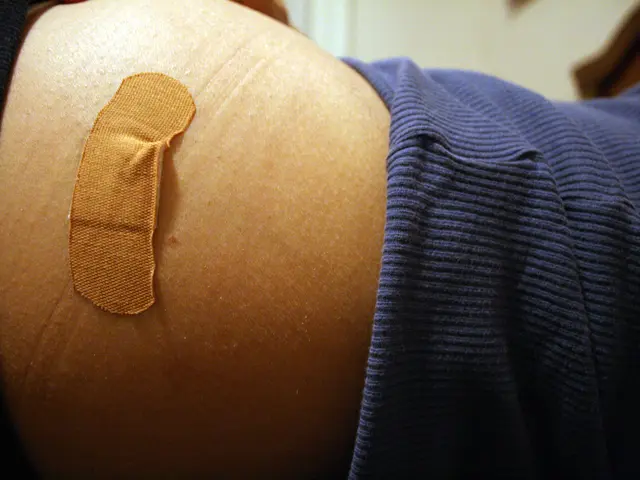Exploring senescence and life extension: Could coffee potentially impact these processes?
Coffee might offer a multitude of health advantages for individuals, especially women, with research constantly evolving to explore its potential benefits further.
Experts show keen interest in coffee's role in shaping the well-being of specific demographics, particularly women. At the Nutrition 2025 conference, a study was shared that indicated middle-aged women who drink coffee regularly could be more likely to live a healthy life as they age.
The study's data, derived from the Nurses' Health Study, showcased that regular coffee consumption could decrease the chances of experiencing physical limitations, memory complaints, mental health issues, cognitive impairments, or major chronic diseases as women advanced in age.
Presented at the conference between May 31-June 3, 2025, in Orlando, FL, the findings are yet to be published in a peer-reviewed journal.
The Intersection of Coffee and Aging Gracefully
Aging healthily means leading a life that is free from major chronic diseases, cognitive impairments, mental health issues, physical limitations, and memory complaints. Healthy aging consists of living to at least 70 years of age.
The research in this study analyzed data from a cohort of 47,513 women over three decades.
The team focused on participants' caffeine intake from various sources, including regular and decaf tea, cola, and regular and decaf coffee. The baseline caffeine exposure was established based on the average of the 1984 and 1986 food frequency questionnaires.
The study's results showed that most caffeine intake came from coffee. At the median caffeine consumption, it was 315 mg per day. Total caffeine intake seemed to increase the chances of women experiencing healthy aging and its related elements. Regular coffee, in particular, enhanced the possibility of healthy aging.
No associations were observed between healthy aging and drinking tea, decaffeinated tea, or decaffeinated coffee. The results also hinted that consuming cola might lessen women's likelihood of healthy aging.
Study author Sara Mahdavi, BSc, HBSc, RD, MSc, PhD, a postdoctoral fellow at Harvard T.H. Chan School of Public Health at Harvard University, and adjunct professor at the University of Toronto, Canada, in the Faculty of Medicine, Department of Nutritional Sciences, highlighted the following findings of the study to Medical News Today:
"We found that moderate intake of caffeinated coffee during midlife was modestly associated with healthy aging later in life. We defined healthy aging stringently: Not only surviving into older age, but doing so without major chronic disease, cognitive decline, physical disability, or poor mental health. Each additional cup of coffee was linked to about a 2% higher chance of healthy aging, while cola intake was associated with a 20% lower chance. The association appeared to be dose-responsive for coffee, though modest, and was not observed with decaf or tea, possibly due to lower intake and differences in bioactive content."
Interpreting the Study's Findings
Although the study appears promising for coffee enthusiasts, it's essential to note that its findings should be interpreted with caution.
For instance, due to its limited participant demographic (mainly white women), it would be useful to see if the same findings can be replicated in other demographic groups. Additionally, considering that at least some data relied on participants answering health-related questions, there could be some errors related to this, and researchers may not have accounted for confounding factors that could have impacted the study's overall results.
Further details about the study are also unclear. For example, it is not known how researchers addressed factors like caffeine intake changes or other coffee additive scenarios.
Bruce G. Rankin, DO, CPI, FACOFP, president of the Florida Osteopathic Medical Association, who was not involved in the current study, told Medical News Today that:
"Meta-analysis studies could further support the theory that moderate amounts of caffeinated coffee daily promote healthy aging. If the results show they are reproducible, then it would suggest caffeinated coffee provides a clinical health benefit over time to women. We know that caffeinated coffee in moderation is safe for the general population. There are health conditions that require close monitoring of excessive caffeine intake, like hypertension."
Caffeinated Coffee and a Healthy Lifestyle
Despite the noted benefits of coffee, there should be appropriate caution, especially for individuals taking medications that control chronic conditions. It is advisable to consult a doctor about how caffeine might interact with medications or impact underlying health conditions.
Sherry Ross, MD, a board-certified OB/GYN and Women's Health Expert at Providence Saint John's Health Center in Santa Monica, CA, who was not involved in the study, said regarding its implications:
"The clinical implications of this study support the health benefits of moderately consuming caffeinated coffee, and that, with its antioxidants and other bioactive compounds, it should be encouraged for healthy aging. This study also shows that reducing the amount of sugary soft drinks should be encouraged for healthy aging. The non-alcoholic beverages you consume with aging should be an important part of lifestyle choices made to give you the best chance of living a healthy and long life."
- The research presented at the Nutrition 2025 conference suggested that regular coffee consumption might increase the chances of middle-aged women experiencing healthy aging.
- The study, mainly focusing on women, found that moderate intake of caffeinated coffee during midlife was modestly associated with healthy aging later in life.
- According to the study's results, total caffeine intake seemed to increase the chances of women experiencing healthy aging and its related elements, with regular coffee enhancing the possibility of healthy aging.
- The study's author, Sara Mahdavi, mentioned that each additional cup of coffee was linked to about a 2% higher chance of healthy aging, while consuming cola might lessen women's likelihood of healthy aging.
- The findings of the study could potentially suggest that caffeinated coffee provides a clinical health benefit over time to women, but the results should be interpreted with caution due to the limited participant demographic.
- In light of the study's implications, reducing the amount of sugary soft drinks should be encouraged for maintaining a healthy and long life, as suggested by Dr. Sherry Ross, a board-certified OB/GYN and Women's Health Expert.
- Appropriate caution should be taken, especially for individuals taking medications that control chronic conditions, as consultations with a doctor about caffeine interactions and impact on underlying health conditions are advisable.







